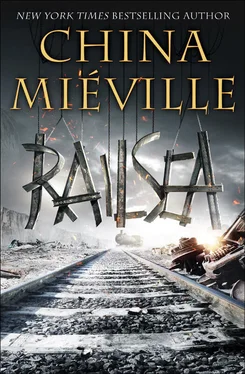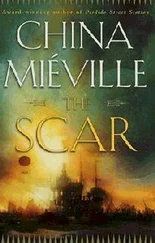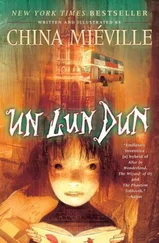Alone at last, back on the train, he had checked his own camera. That she had not seen him use. There it was. The picture. Horribly compromised by his shakes. Off-centre. But there it was, & it was not mistakable. The single rail.
He bit his lips.
There was a family. At the centre of the railsea. A woman & man of that family had left. Exploring? The extraordinary trainless landscapes. Exploring. Past animals. Past a place where what might be an angel prowled. Just far enough from it to stay safe. Through areas beyond the known railsea. To (that line) … to (that single line) … to that single line. To where the railsea untangled. & out of it.
& then they had come back. By some strange route, at last via the fringes of the Arctic. Heading, surely, for home. Where those children waited.
What a journey, Sham thought, & knew that that sister & brother needed to know what had happened. Those trainsfolk had been returning for them, & it was their right to know that. If someone found anything of the train my father’d been on , thought Sham, I’d want to know .
& they would. Whatever strangeness it was, that impossible rail, it was a priceless insight. The captain, he had thought, must be desperate to get going. He thought she must be working out routes to get them to Manihiki lickety-split. Where she & her officers could do whatever it was they’d do, work out how & to whom to sell the information, reconstruct the route those flatographs represented. & meanwhile, if they weren’t going to do it themselves, he, Sham, could pass on the sad news of the train’s & the trainsfolks’ demise to that boy & that girl.
That was what the captain must be doing.
“Your train’s away soon, then,” the harbourmaster said approvingly to Vurinam, in Sham’s hearing. “Good good. I hear chatter.”
Chatter about what? Sham wanted to ask. But he never got that information, & in Bollons chatter itself—as currency, bait & weapon—was trouble enough. Then word of their intended route had got out, & Sham had, in disbelief, realised Naphi had meant what she first said. That it had not been a moment’s reflexive denial of an underling while a plan was hatched. That Naphi was not taking them to Manihiki.
He considered saying something, but remembering her rejoinder to his first attempt, unconsidered it. Well then, he thought at last, as pugnacious as he could make his inner voice, if she really wasn’t intending to go there anyway, as she bloody well should, he’d just have to persuade her.
THE BEST-LAID PLANS can go belly up, & Sham’s was not even best laid. Twice he started to approach the captain, heart clatternaming on his inner rails, ready to ask her how she could do this, what this was, this refusal to pursue those images, her resolute not-talking-about-it-ness. The Medes set out, & headed in, as far as Sham was concerned, entirely the wrong direction, & he couldn’t think of a thing to say to her. & each time she looked at him one second too long, with very cold eyes, & he swallowed & turned away. & instead of to Manihiki, home to Streggeye Land they went.
ON THE DOWN SIDE, ONE OF THE MEDES TRAINSFOLK had been left behind, flesh & muscle gnawed off his bones, in an ether-smelling shed on the shores of a land he didn’t know or like. On the up side, they’d snaffled quite the moldywarpe. Their holds were full of salted molemeat, barrels of rendered mole-oil, carefully cured skin & fur.
Between the Cape of Chatham & the questionable little hardland islands of the Leweavel Range, they snaffled two star-nosed moles. Where interline railsea earth was churned up, they would slow, & the women & men of the Medes cast with their rods & angled for small burrowers. They dangled wire lines, weighted & hooked & baited clockwork corkscrews that coiled & ground in the dirt, dragging snips of meat. Eventually something might grab, tug the line & veer off through the earth. The anglers would tussle, play out wire, bring up wriggling frantic bodies at line’s-end & reel them in.
They caught the smallest moldywarpes, that grew with the telling, arm-length hunting earthworms that made the crew howl in disgust, beetles as big as their heads, that, depending on their island of origin, some would eat & others throw back. Shrews, muskrats, carnivorous rabbits. Burrowing bees. This was a rich stretch of railsea. Fussy, tidying rail angels did not come here often, it seemed: there was edible weed protruding between untended rails, that the crew snatched for salad.
“Mr. Vurinam.” Sham practised clearing his throat to introduce a topic. “Dr. Fremlo.” He thought of those images he had seen & decided that dammit, yes, he would, he would tell them, that they were his friends were they not?
But the secrets dried up in his mouth like unloved fuel tanks. It was simply too much , that stretch, that solitary iron road, too impossible to be describable. He could show them the picture. But even if that shaky flatograph would mean anything to one who had not seen the original, word of his words would surely reach the captain. & that would be him committing incitement to mutiny.
It was not only that he was intimidated by her—though certainly, yes, he was. It was a sense Sham could not shake, that it would not be unhelpful to have her on his side.
TWICE, THEY PASSED close enough to trains from Streggeye that they halted & connected to each other via catapulted rope-pulley, to exchange gossip & letters. Captain Skaramash of the outgoing Murgatroyd visited them for tea. Over he came, sitting sedately in a dangling chair hauled & swaying across the yards of tracks.
While Shossunder & Dramin brought in the best tea & dry biscuits & silver & porcelain, Sham clambered the outside rear of the caboose—astonished by himself as he did—& hunkered out of sight, flattened at a porthole, listening & catching glimpses.
“So, Captain Naphi,” he heard Captain Skaramash say. “You’ll do me a service if you can help me. I’m looking for a certain beast. A grand, big fellow.” His voice took on a certain tone. “A ferret. At least a carriage-long. & in his head he carries a hook. I gave him that. It protrudes out now like crooked fingers, dangling back. Beckoning me.” He whispered. “Beckoning me wherever he goes. Old Hookhead.”
So Skaramash had a philosophy, too, & that’s what he was after. Right then, get on with it , Sham thought. Captain Naphi cleared her throat.
“No such animal’s crossed our paths,” she said. “Be assured I know now your vehicle’s name, & at the first sign of that beckoning metal in a sinuate mustelid eruchthonous presence, I shall take careful notes of locations. & I shall get you word. On my honour as a captain.”
“I thank you,” Skaramash murmured.
“I don’t doubt yours took something from you, as mine took something from me,” Naphi said. Skaramash nodded, on his face an expression of speculation & grimness. Which now that he formulated that in his head, Sham realised was the expression he most usually saw on any captain’s face. It was their mien.
Skaramash rolled up a trouser leg, knocked his knuckles on wood & iron beneath. Captain Naphi nodded appreciatively, then raised her light-winking arm, its intricate molebone, jet & metal. “I remember the feel as those teeth closed,” she said.
“I’m grateful for your help,” said Skaramash. “& for my part I will watch for the custard-coloured moldywarpe.”
Sham’s eyes widened.
“ Old-tooth coloured, Captain,” Naphi said harshly. “A great mole the hue of ancient parchment. Ivory-reminiscent. Lymphlike. A white stained like the old eyes of frantically ruminating scholars, Captain Skaramash.”
Читать дальше












